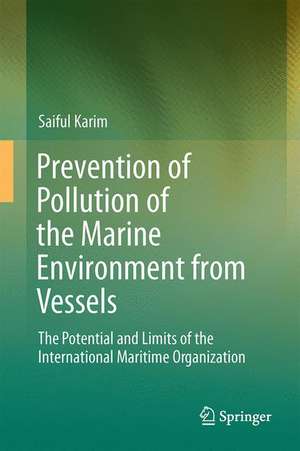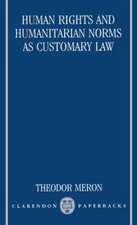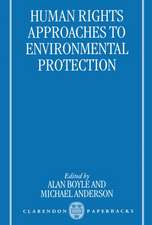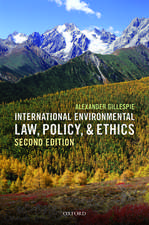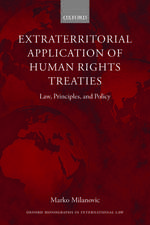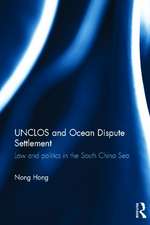Prevention of Pollution of the Marine Environment from Vessels: The Potential and Limits of the International Maritime Organisation
Autor Md Saiful Karimen Limba Engleză Hardback – 19 noi 2014
The IMO, a United Nations specialized agency, has been entrusted with the duty to provide machinery for cooperation among governments for the prevention and control of pollution of the marine environment from vessels. The organization is responsible for drafting legal instruments as well as for facilitating technical cooperation for the protection of the marine environment. Although IMO legal instruments are mainly targeted at the prevention of pollution of the marine environment from vessels, there is a trend towards a liberal interpretation of this, and the organization has expanded its work to areas likeshipbreaking, which is essentially a land-based industry.
| Toate formatele și edițiile | Preț | Express |
|---|---|---|
| Paperback (1) | 721.63 lei 6-8 săpt. | |
| Springer International Publishing – 22 sep 2016 | 721.63 lei 6-8 săpt. | |
| Hardback (1) | 727.66 lei 6-8 săpt. | |
| Springer International Publishing – 19 noi 2014 | 727.66 lei 6-8 săpt. |
Preț: 727.66 lei
Preț vechi: 887.39 lei
-18% Nou
Puncte Express: 1091
Preț estimativ în valută:
139.25€ • 146.42$ • 115.05£
139.25€ • 146.42$ • 115.05£
Carte tipărită la comandă
Livrare economică 17 aprilie-01 mai
Preluare comenzi: 021 569.72.76
Specificații
ISBN-13: 9783319106076
ISBN-10: 3319106074
Pagini: 150
Ilustrații: XVI, 172 p. 1 illus.
Dimensiuni: 155 x 235 x 17 mm
Greutate: 0.45 kg
Ediția:2015
Editura: Springer International Publishing
Colecția Springer
Locul publicării:Cham, Switzerland
ISBN-10: 3319106074
Pagini: 150
Ilustrații: XVI, 172 p. 1 illus.
Dimensiuni: 155 x 235 x 17 mm
Greutate: 0.45 kg
Ediția:2015
Editura: Springer International Publishing
Colecția Springer
Locul publicării:Cham, Switzerland
Public țintă
ResearchCuprins
1. Introduction.- 2. IMO Institutional Structure and Law-Making Process.- 3. Pollution Prevention, Response and Compensation.- 4. Management of Ships’ Ballast Water and Biofouling.- 5. Recycling of Ships.- 6. Reduction of Emissions of Greenhouse Gas from Ships.- 7. Implementation of IMO Legal Instruments: International Technical and Financial Cooperation.- 8. Conclusion.
Recenzii
“The book presents a complex issue in an attractively simple way. The author’s arguments are appealing and are presented in a concise, but pointed, narrative. Students of law or environmental studies, lawyers, judges, academics, environmentalists, policy-makers, and anyone interested in a critical overview of the law and policy concerning marine pollution would find this book extremely useful.” (Ridwanul Hoque, Yearbook of International Environmental Law, Vol. 25, 2016)
Textul de pe ultima copertă
This book examines the role of The International Maritime Organization (IMO) in the prevention and control of pollution of the marine environment from vessels with a particular reference to the current north-south tensions regarding the strategy for combating climate change in the maritime sector as well as the prevention of marine pollution from the ship-breaking industry.
The IMO, a United Nations specialized agency, has been entrusted with the duty to provide machinery for cooperation among governments for the prevention and control of pollution of the marine environment from vessels. The organization is responsible for drafting legal instruments as well as for facilitating technical cooperation for the protection of the marine environment. Although IMO legal instruments are mainly targeted at the prevention of pollution of the marine environment from vessels, there is a trend towards a liberal interpretation of this, and the organization has expanded its work to areas likeshipbreaking, which is essentially a land-based industry.
The IMO, a United Nations specialized agency, has been entrusted with the duty to provide machinery for cooperation among governments for the prevention and control of pollution of the marine environment from vessels. The organization is responsible for drafting legal instruments as well as for facilitating technical cooperation for the protection of the marine environment. Although IMO legal instruments are mainly targeted at the prevention of pollution of the marine environment from vessels, there is a trend towards a liberal interpretation of this, and the organization has expanded its work to areas likeshipbreaking, which is essentially a land-based industry.
Caracteristici
Critically discusses the role of International Maritime Organization (IMO) in the protection of the marine environment Presents a clear, updated, concise and critical overview of the IMO marine environmental legal instruments A fresh outlook on the north-south tensions in the IMO marine environmental discourses Critically examines the principle of common but differentiated responsibilities in the context of IMO Includes supplementary material: sn.pub/extras
